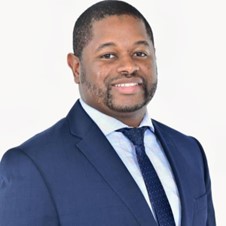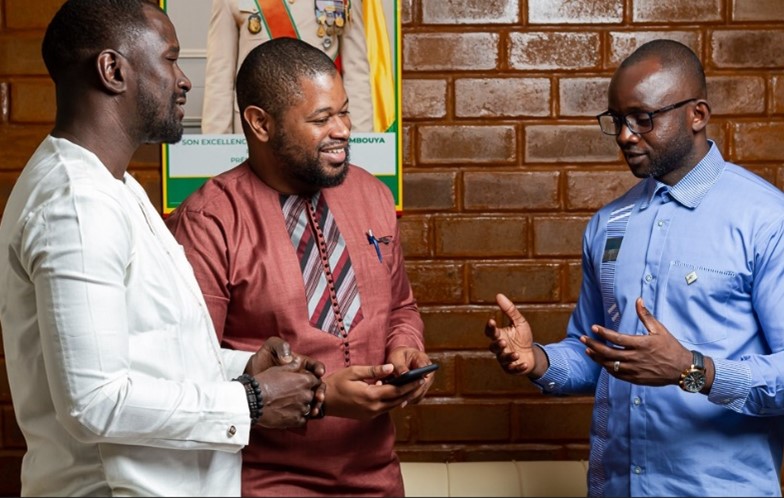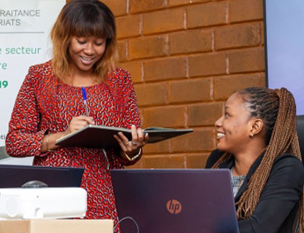Blog
Connected Communities multimedia series
This story is part of IFC’s Connected Communities multimedia series. Click here to view other stories from the series.
Blog
December 7, 2023
In 2018, the IFC team partnered with the Guinea Ministry of Mines to create an online platform, called the Supplier and Partnership Marketplace—or Bourse de Sous-Traitance et de Partenariats (BSTP), which gives local SMEs access to the supply chains of large mining projects. The work was enabled by a multifaceted Canada-IFC program that supports local economic development linked to energy and mining investment in Cote d’Ivoire, Ghana, Guinea, and Kenya. In May 2023, IFC interviewed Saifoulaye Balde, BSTP Executive Director. Here are excerpts from the conversation.

Saifoulaye Balde, Executive Director, BSTP
Tell us about the BSTP and why it was created?
The BSTP is an online tool to let local suppliers know that the large mining companies operating in the area are issuing tenders, and to let the large companies know there are local suppliers that are qualified.
What were the specific challenges that the BSTP responded to?
The goal was to fill three gaps. The first was the information gap. Before the BSTP, if you wanted to have access to a tender, you had to go directly to the mining company. The platform consolidates bids and matches companies with suppliers for more efficiency, wider reach, and increased local participation.
The second was a skills gap. The marketplace provides training for these local companies so they can compete, building their capabilities, systems, and processes to qualify for the tenders.
The third was a finance gap. You can have the best prepared tender in the world but if you can’t fund your operations, you won’t be able to fulfill it. We now have ten financial institutions that participate in the marketplace and provide small business loans to members.
Initially, the marketplace was focused on the mining sector, but we are now diversifying beyond mining. The hope is that this becomes a model for other economic sectors.
How challenging was it to cut through established ways of doing business?
 Extremely! To achieve results, we needed to have all the stakeholders on board. That was really difficult at first. But we were able to bring them to the table because they shared a commitment to help build a better Guinea.
Extremely! To achieve results, we needed to have all the stakeholders on board. That was really difficult at first. But we were able to bring them to the table because they shared a commitment to help build a better Guinea.
We also needed to convince the buyers of the value in registering, because we charge a fee, ranging from about $30,000 for big companies to about $5,000 for banks and insurance companies and other intermediaries. We communicate this value in ways they understand.
Are you seeing increase in uptake?
We know we are succeeding because we are getting calls from more buyers interested in signing up and the size of the contracts awarded through the platform gets bigger every year.
How has IFC’s support contributed to the BSTP’s success?
IFC has played a critical role from the very beginning. IFC was instrumental in getting the big mining companies to sign on, including IFC’s own clients—and this was huge. The partnership has included technical capacity building, financing, tools, and strategy, all of which enabled us to upgrade and streamline the platform so it is much more user-friendly. IFC is truly helping us get to the next level, so we can be sustainable on our own.
How are you ensuring that businesses run by women and youth have a shot at these tenders?

Dramira and Ramata, both entrusted with operations and customer relations at BSTP, are preparing for BSTP’s weekly open house sessions with local SMEs.
We do place strong emphasis on women. In fact, we have set a target that at least 30 percent of contracts facilitated are awarded to women businesses. We’ve seen that when women win contracts, they tend to spread the wealth, to ensure that their communities benefit. But to win the contracts, their finance and knowledge needs must be addressed. We’re doing this by helping them access loans through a dedicated loan facility supported by IFC and offering specialized master classes, focused on business skills like accounting. We’re also encouraging our mining industry partners to consider gender equality in their own operations—women can handle mining jobs, but they need to be given the chance.
Another integral part of the marketplace is our work with young entrepreneurs. We’ve already trained more than 100 young people on operating machinery, developing business plans, and applying for loans. If we can give more young people jobs and income, they will be the ones who can help Guinea avoid economic disaster in the future.
What are you most proud of?
“I am really proud of the impact we are having on small businesses. For example, we worked with a small catering company on how to ramp up their operations, and we connected them with financing sources. They started winning contracts and today, they have about 30 percent market share in business catering. Going from 0 percent to 30 percent market share in just a few years is no small feat!”
Since 2018, the marketplace has awarded $61 million in contracts and $11 million in financing. We have trained more than 5,000 SME owners and workers. For Guinea, this is huge.
Looking ahead, where do you see the marketplace going?
Right now, the main priority is continuing to build the capacity of our suppliers. Another priority is helping companies access the finance they need. This can be challenging since some of them don’t have collateral to put up for loans or can’t meet other financing requirements. A third priority is to continue improving the platform, which has the potential to become an even more valuable resource for the country. This is especially true in light of Guinea’s new local content law, which will require companies to source more of their goods locally. We have the capacity, the tools, and the working model to play an even larger role in leading local content development in Guinea. We want to be the motor that powers Guinea’s economic growth.
Saifoulaye Balde has 15 years of experience in finance, public administration, and business management. He has held various prominent roles, notably at the Agency for the Promotion of Private Investments and the Industrial Development and SME Fund. Holding an MBA from the University of Sherbrooke and a GDBA from the Molson School of Business in Montreal, Saifoulaye has been the Executive Director of the Subcontracting and Partnership Exchange of the Republic of Guinea since June 2022. He and his team have undertaken extensive initiatives to enhance the involvement of Guinean companies in ongoing major projects in the country, ensuring that Guinean local content becomes an integral part of mining and industrial value chains.
This story is part of IFC’s Connected Communities multimedia series. Click here to view other stories from the series.
Read the blog on building institutions and business in Ghana and Guinea

Blog

Blog
This site uses cookies. By continuing to browse the site, you are agreeing to our use of cookies.
OKLearn moreWe may request cookies to be set on your device. We use cookies to let us know when you visit our websites, how you interact with us, to enrich your user experience, and to customize your relationship with our website.
Click on the different category headings to find out more. You can also change some of your preferences. Note that blocking some types of cookies may impact your experience on our websites and the services we are able to offer.
These cookies are strictly necessary to provide you with services available through our website and to use some of its features.
Because these cookies are strictly necessary to deliver the website, refusing them will have impact how our site functions. You always can block or delete cookies by changing your browser settings and force blocking all cookies on this website. But this will always prompt you to accept/refuse cookies when revisiting our site.
We fully respect if you want to refuse cookies but to avoid asking you again and again kindly allow us to store a cookie for that. You are free to opt out any time or opt in for other cookies to get a better experience. If you refuse cookies we will remove all set cookies in our domain.
We provide you with a list of stored cookies on your computer in our domain so you can check what we stored. Due to security reasons we are not able to show or modify cookies from other domains. You can check these in your browser security settings.
We also use different external services like Google Webfonts, Google Maps, and external Video providers. Since these providers may collect personal data like your IP address we allow you to block them here. Please be aware that this might heavily reduce the functionality and appearance of our site. Changes will take effect once you reload the page.
Google Webfont Settings:
Google Map Settings:
Google reCaptcha Settings:
Vimeo and Youtube video embeds:
You can read about our cookies and privacy settings in detail on our Privacy Policy Page.
Privacy Policy